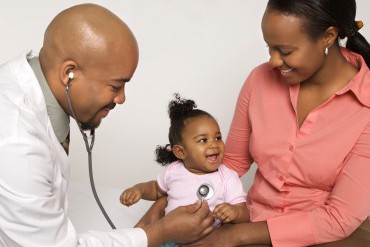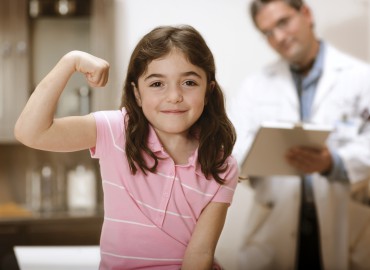Practice Consultation and Training Resources
Visit our Training page to learn more about practice consultation and training provided at no cost by Iowa EPSDT Care for Kids.

Iowa 1st Five Initiative
Healthy Mental Development
The 1st Five Healthy Mental Development Initiative is a public-private partnership bridging primary care and public health services in Iowa. The 1st Five model supports health care providers in the early detection of social-emotional and developmental delays and family risk-related factors in children birth to age 5, and coordinates referrals, interventions and follow-up.
Visit the 1st Five website to find links to resources for professionals and parents, program materials and videos, and links to related information.
CDC Early Brain Development and Health Resources
A Healthy Start for the Brain
The Centers for Disease Control and Prevention maintains information and resources on Early Brain Development and Health, which is essential to the health and well being of children. The website includes links to resources to help support early childhood experiences. Also included is a link to CDC Grand Rounds: Addressing Health Disparities in Early Childhood to the health and well-being of children.
AAP Bright Futures
Bright Futures Guidelines
Bright Futures is a national health promotion and prevention initiative, led by the American Academy of Pediatrics (AAP). AAP's Bright Futures Guidelines provide theory-based and evidence-driven guidance for all preventive care screenings and well-child visits for infants, children, adolescents and their families.
AAP PediaLink
Online Learning Center
PediaLink: the AAP Online Learning Center provides a continuing education course online, “Promoting Early Brain and Child Development (EBCD): Building Brains, Forging Futures.” The course focuses on child development as the foundation for community and economic development, and includes lectures and learning objectives from the 2013 Peds21 Symposium.
Center on the Developing Child
Harvard University
The Center on the Developing Child at Harvard University offers an online resource website has brief videos, lectures on video and written briefs which cover the areas of pediatric brain development and the science of children’s social, emotional and behavioral development. Special attention is given to the interaction between the environment in which a child develops and the impact on the developing brain.
AAP Medical Home
A medical home is an approach to providing comprehensive primary care that facilitates partnerships between patients, clinicians, medical staff, and families. A medical home extends beyond the four walls of a clinical practice. It includes specialty care, educational services, family support and more.
Visit the AAP National Resource Center for Patient/Family-Centered Medical Home, a national technical assistance center, for resources on improving the health and well-being of, and strengthening the system of services for, children and youth with special health care needs and their families by enhancing the patient/family-centered medical home.
Resources for Special Needs Populations in the Medical Home
Adoption
- CDC International Adoption
- AAP International Adoption - Suggested Reading
- University of Minnesota - Adoption Medicine Clinic
Immigrant Screening
Genetic Disorders
General
- CDC - Genetic Disorders: General overview and information about a variety of genetic conditions
- GeneReviews: Good resource for a variety of genetic disorders
- Rare Chromosome & Gene Disorder Guides: Information about some of the more rare genetic disorders
- GEMSS for Schools: Help for school professionals who work with children with certain medical problems
Specific Genetic Conditions
Other Disorders
- Spina bifida
- Cerebral Palsy
- Autism spectrum disorders
The University of Iowa Center for Disabilities and Development worked with the UI College of Public Health to create PrepKids, a preparedness training for parents and custodians of children with disabilities who live in rural areas. Families can access the PrepKids 2017 presentation to help them develop emergency preparedness plans for their children.
The presentation, Personal and Family Emergency Preparedness, is available for free on YouTube. It features the national message, “be ready to take care of yourself for 3 days,” and includes a discussion of the 7 steps to preparedness from the PrepKids Booklet.
Billing & Coding
This website provides information about billing and coding for:
- Comprehensive EPSDT preventive medicine exams
- Developmental testing
- Autism screening
- Adolescent depression screening
- Alcohol and drug use screening
- Emotional/behavioral screening
- Diagnosis
Visit our Billing & Coding page to find more information.
Caring for LGBTQ Kids
Gender-Affirmative Care
Children and teenagers can begin to identify at young ages as lesbian, gay, bisexual, queer or questioning (LGBTQ), or otherwise gender nonconforming. Healthcare encounters can be difficult for these children and young adults, knowing how to work with youth who are GLBTQ can promote both their physical and mental health. The American Academy of Pediatrics (AAP) published “Ensuring Comprehensive Care and Support for Transgender and Gender-Diverse Children and Adolescents,” in its October 2018 issue of Pediatrics to provide information on epidemiology, mental health implications, developmental considerations, and a gender-affirmative care model for those who care for LGBTQ kids. Link to the AAP article.
The University of Iowa Hospitals and Clinics has an LGBTQ Clinic to serve both pediatric and adults who identify as GLBTQ. Clinic staff have had LGBTQ-specific cultural humility training to assure a welcoming and supportive environment for all patients. Link to the UIHC clinic webpage.
Resources for Transition Planning
The Academy of Pediatrics recommends that transitioning to adult health care begin at 12 years of age. Find more about the transition from adolescent to adult health care from the AAP's Transition Resources.
Got Transition?
The Got Transition website is an excellent resource for professionals, teens and families. It covers all aspects of transition planning.

Website Accessibility
Iowa EPSDT is committed to making our information and materials accessible to everyone.
To increase the font size on site pages, hold down CTRL and press + on a PC. Hold down Command and press + on a Mac.

